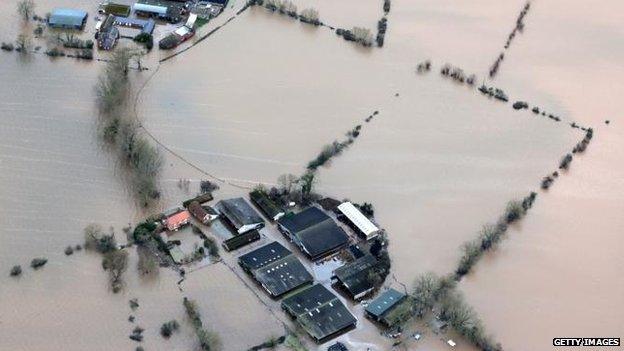River pollution could be increased by wetter winters
- Published
Lead researcher Prof Philip Haygarth explains how wetter winters in future could pollute our rivers, and how science could help
Wetter winters in the future could increase agricultural pollution in Britain's rivers, say scientists.
A research team from Lancaster University concluded that increased, more intensive winter rainfall is likely to wash more fertiliser out of soil and into rivers.
This could artificially nourish plants, including toxic algae.
The research team is now embarking on a project to help predict and ultimately mitigate agricultural pollution.
Its study aims to work out how the changing climate and agricultural land use combined are likely to affect our waterways.
Lead researcher Prof Philip Haygarth, external explained that it was not just the rainfall that could cause problems, but the temperature.
"Drier, hotter summers mean that the processes in the soil will change and that the soil will crack open," he explained.
"This will create pathways in the soil for water to flow.
"So what we're doing in this project is trying to study the processes that might take place in the future and use climate models to help run scenarios so we can better manage it in the future."
The project - Nutrients in Catchments to 2050 , external- involves researchers from several institutes across England and Wales, including the Met Office Hadley Centre, Bangor University and Liverpool University.
The scientists involved are combining direct measurements of water quality with climate models.
This basically helps paint a picture of how much fertiliser the soil will be able to absorb, and how much will wash through.
"We need to be able to do the best science possible with the latest computer models, with the best data possible to make the best predictions about what's going to happen in the future with land use and with climate," he told BBC News.
"[This will mean] we can help mitigate water quality, adapt and also help farmers do the best they can for food production."
The Environment Agency said that currently just 25% of rivers in England and Wales met the criteria for "good status" in terms of water quality.
The agency told the BBC: "The health of the UK's rivers has dramatically improved in the past 20 years but there is still much to do. We know European standards will be tough to meet in the coming years - given the country's combination of industrial legacy, urban development, transport infrastructure, farming activity and population growth - but the target is a useful driver for restoring rivers across the UK and Europe."

Many farms were deluged in the most recent winter floods
An agency spokesperson added that investing in "catchment sensitive farming" was a priority and that this research would be "very useful".
Although the research areas are focused on catchment areas in England, Prof Haygarth emphasised that this was a "international problem".
"Farmers are doing the best they can," he added.
"It's very difficult to manage these things, and we're trying to work with them to adapt."
- Published12 February 2014
- Published18 February 2014
- Published10 January 2014
- Published4 March 2013